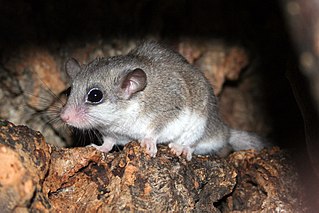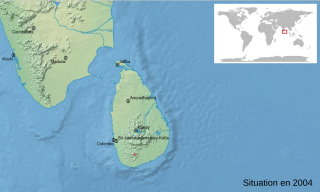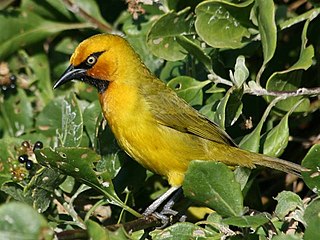Related Research Articles

The pratincoles or greywaders are a group of birds which together with the coursers make up the family Glareolidae. They have short legs, very long pointed wings and long forked tails.

Tethea ocularis, the figure of eighty, is a moth of the family Drepanidae. The species was first described by Carl Linnaeus in his 1767 12th edition of Systema Naturae. It is found throughout Continental Europe and has a scattered distribution in England and Wales, although it is absent from Scotland and Ireland.

The little grass frog is a species of chorus frog endemic to the Southeastern United States. It is currently the smallest North American anuran and occurs in a wide variety of ephemeral and semi-permanent wetlands.

The African dormice are dormice that live throughout sub-Saharan Africa in a variety of habitats. They are very agile climbers and have bushy tails. They eat invertebrates and small vertebrates.

Pseudophilautus ocularis, known as Golden-eyed Shrub Frog is a species of frogs in the family Rhacophoridae.

The spectacled weaver is a species of bird in the family Ploceidae. It is found widely in woodland, forest edge and gardens of central, eastern and south-eastern Africa, but is absent from the most arid regions and dense, primary rainforest. This common species breeds in solitary pairs, and both sexes are bright yellow, have an olive-yellow back, black "spectacles" and pale eyes. The male has a black throat.

Radde's accentor is a species of bird in the family Prunellidae. It is found in mountainous parts of Yemen and northern Southwest Asia.

The Madagascar pratincole is a species of bird in the family Glareolidae. It is found in Comoros, Ethiopia, Kenya, Madagascar, Mozambique, Somalia, Tanzania, possibly Mauritius, and possibly Réunion. Its natural habitats are subtropical or tropical seasonally wet or flooded lowland grassland, rivers, freshwater lakes, rocky shores, and intertidal marshes. It is threatened by habitat loss.

The spectacled dormouse or namtap is a species of rodent in the family Gliridae, and one of four dormouse species endemic to South Africa.

The Ceram fruit bat or Seram flying fox is a species of megabat in the family Pteropodidae. It is endemic to the mountainous forests of two Maluku islands, Buru and Seram, including the Manusela National Park on Seram. They were once present on the nearby Ambon Island, but probably not anymore. The habitat has an area of less than 20,000 km2, and is decreasing due to logging. For this reason, and because of hunting by the local population, these species are listed as vulnerable by the IUCN since 1996.

The Pteropodinae are a subfamily of megabats. Taxa within this subfamily are:
Northwest River Natural Area Preserve is a 2,774-acre (11.23 km2) Natural Area Preserve located in the city of Chesapeake, Virginia. Located along the Northwest River, the preserve protects upland forests as well as swamps and marshes along the river.
Hypotrix ocularis is a moth of the family Noctuidae. It is found from south-western New Mexico and south-eastern Arizona southward to Mexico City.
Parker's worm snake is a species of snake in the Typhlopidae family.
Stenophloeus ocularis is a species of beetle in the family Cerambycidae, and the only species in the genus Stenophloeus. It was described by Hintz in 1910.
Mariliana ocularis is a species of beetle in the family Cerambycidae. It was described by Hope in 1846. It is known from Argentina and Brazil.

Bathymunida ocularis is a species of squat lobster in the family Munididae. The specific epithet is derived from the Latin ocularis, meaning "of the eyes", in reference to the granulated eyestalks that are unique to the species. It is found off of the Loyality Islands, at depths of about 240 metres (790 ft).
Ctenisodes ocularis is a species of ant-loving beetle in the family Staphylinidae. It is found in North America.

Epuraea ocularis is a species of sap-feeding beetle in the family Nitidulidae. It is found in Africa, Europe and Northern Asia, North America, Oceania, and Southern Asia.
Rufous-tailed jungle flycatcher has been split into the following species:
References
- ↑ [ Biolib.cz - Esaguasu ocularis]. Retrieved on 8 September 2014.